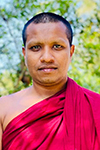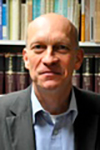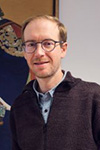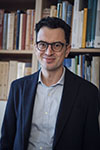Members
 |
Stefan Baums (Indology) Stefan Baums teaches Buddhist literature in Sanskrit, Pali and Gāndhārī and is lead researcher of the Buddhist Manuscripts from Gandhāra project. Before joining the University of Munich, he worked as a visiting professor at the University of California, Berkeley. His interests include Buddhist philology and epigraphy, the development of Buddhist hermeneutics, Sanskrit poetic and narrative literature, and ancient South Asian history. |
 |
Upulvehere Dhammawasa (Indology, Buddhist Studies) Ven. Upulvehere Dhammawasa received his Master's Degree in Buddhist Studies from the Centre for Buddhist Studies in the Faculty of Arts at the University of Hong Kong in 2023. His dissertation focused on the views of the elders Mahāpaduma and Mahāsumma. The current title of his doctoral project is: "Interpreting the Pāli Vinaya between the 1st Century BCE and the 4th Century CE: Views of the Elders Mahāpaduma and Mahāsumma as Reflected in the Samantapāsādikā". |
|
Anh Tu Duong (Japanese Studies) Anh Tu Duong completed his M.A. at the University of Oregon on "American Mindfulness: A Case Study of the Transnational Reception of "Mindfulness - Maindofurunesu" in Japan and is pursuing his Ph.D. at LMU. The current title of his doctoral project is "Tradition & Innovation in Contemporary Japanese Religions: A Case Study of Japanese Zen Buddhism & American Mindfulness". |
|
 |
Hans van Ess (Sinology) As Professor of Sinology, his scholarly interests focus on Chinese historiography and philosophy, especially Confucianism. He also lectures on Chinese Buddhism. He holds the position of the Vice President of the University of Munich for several years now, and is thus only able to participate in limited form, although he supervises dissertation projects in sinology-related Buddhist studies. He is also the president of the Max-Weber-Stiftung - Deutsche Geisteswissenschaftliche Institute im Ausland. |
 |
Fu Fan (Indology) Fu Fan completed his M.A. in Indology at LMU in 2023 with a thesis on religious plurality, particularly non-Buddhist religious practice in the inscriptions of the Sātavāhana dynasty. His dissertation focuses on the Sanskritization of epigraphic languages from the second to the fifth century AD and the shift from Middle Indo-Aryan languages to Sanskrit in inscriptional discourse. The current title of his doctoral project is: "Sanskritization of the Epigraphic Languages in the Deccan: from the Second to the Fifth Century CE". |
 |
Sebastian Gäb (Philosophy of Religion) Sebastian Gäb is Professor of Philosophy of Religion at LMU. He studied philosophy, sinology, and Greek philology in Trier and Qingdao. His teaching and research focusses on classical Chinese philosophy, Buddhist philosophy, and ways of transporting Asian thought into the concepts of Western philosophy. He also investigates how Eastern and Western thought can be systematically connected. |
|
Simone Heidegger (Japanese Studies) Simone Heidegger is the coordinator of the Doctoral Program in Buddhist Studies at LMU. In her research she specializes on women/gender in Japanese Buddhism, 20th-century reform movements in Japanese Shin Buddhism, and approaches of intrareligious criticism. In 2006, she published her PhD thesis on gender issues in contemporary Japanese Shin Buddhism. Before joining LMU, she worked and taught at the Museum of Religions and the Study of Religions Department of Marburg University |
|
 |
Jörg Heimbel (Tibetology) Jörg Heimbel is Professor of Tibetology. His research focuses on the religious history of the Tibetan cultural sphere and its associated literary traditions. A particular emphasis lies on the historical processes underlying the formation and dissemination of individual traditions within Tibetan Buddhism, especially the Ngor branch of the Sakya school. His work is grounded in philological and historical analysis of Tibetan textual sources, primarily of biographical and historiographical nature, and is complemented by the study of inscriptions and visual materials such as scroll paintings (thangkas) and sculptures. In addition, his research interests extend to palaeography, book culture, and Buddhist art. At present, he is investigating the diverse functions of dedicatory inscriptions on sacred artworks of the Ngor tradition and developing a systematic classification of these inscriptions. Before his appointment to LMU Munich, Jörg Heimbel served as Lecturer in Classical and Spoken Tibetan at the University of Hamburg from 2014 to 2024. |
 |
Athanaric Huard (Indology) Athanaric Huard is an assistant at the Institute for Indology and Tibetology at LMU Munich. His dissertation (2022) is dedicated to a complete edition of the Tocharian meditation texts and their interpretation. He was previously a collaborator of the ERC project HisTochText (2020-2023) and the Bibliothèque nationale de France (2016-2020). His current research interests include various aspects of Buddhism in Central Asia, particularly the narrative literature of the first millennium (Maitreya literature, Buddhacarita), Sarvāstivāda scholasticism, as well as manuscript studies and paleography of Central Asian Brāhmī. |
 |
Paulus Kaufmann (Japanese Studies) Kaufmann received his PhD in Philosophy 2010 at the University of Zürich. His areas of research include early Japanese Buddhism and the history of Japanese thought, as well as Eastern and Western practical philosophy, philosophy of language and rhetoric. He is currently working on his Habilitation thesis on conceptions of truth and meaning in the work of Kūkai. |
|
Martin Lehnert (East Asian Religion and Philosophy) As Professor for Religion and Philosophy of East Asia, Martin Lehnert is teaches religion and philosophy, also covering subjects such as ethics, music, and ritual. His research has been focused on Esoteric Buddhism, translation, and the reception of Sanskrit exegesis in Chinese commentarial literature. Recent research work addresses theoretical aspects of the function of communication, normativity, as well as the formation of authority in religious systems of meaning. |
|
 |
Huanyou Li (Chinese Studies) Li Huanyou received his M.A. in Chinese Philosophy from East China Normal University in 2020 with a thesis focusing on Wang Fuzhi’s Views of Transformation of Qi as the Heavenly Way. The current title of his doctoral project is "Wang Fuzhi’s Views of Buddhism and their Influence, focusing on Xiangzongluosuo 相宗络索". |
 |
Yifan Li (Study of Religion, Buddhist Studies) Yifan Li received her MA in Religion and Philosophy in Asia from LMU in 2021 with a thesis focusing on representations of Hell in literary and religious sources from Tang to Ming Dynasty. Her current research focuses on the transformation of the God of the Underworld in ancient Indian and ancient Chinese sources. |
 |
Qi Liu (Mongolian / Tibetian Buddhism and Medicine) Liu received her M.A in History of Science from Tsinghua University of China in 2019. Her research focused on the history of traditional Mongolian medicine which is influenced by Tibetan Buddhism. The current title of her doctoral project is "A Comparative Study on Traditional Moxibustion in Mongolian Medicine and Tibetan Medicine". |
 |
Danping Long (Indology, Buddhist Studies) Danping is an interdisciplinary scholar of Buddhism with research interests in Buddhist economy, textual transmission, and narrative literature. Before LMU, she received a B.A. in Liberal Arts and an M.A. in Eastern Classics from St. John's College, as well as an MTS in Buddhist Studies from Harvard Divinity School. Her current research explores how Buddhism taught concepts of generosity within and beyond religious communities between the 1st and 7th centuries CE in the greater Gandhāran region. |
 |
Petra Maurer (Tibetology, Buddhist Studies) As Professor, her scholarly interests range from Tibetan traditional sciences and Buddhism to the cultural history of Tibet, including modern Tibetan history and language. She is currently working in the Central and East Asian Studies Commission of the Bavarian Academy of Sciences and Humanities in Munich on the Dictionary of Written Tibetan. Before joining LMU she lectured at Bonn University and worked on research projects sponsored by the DFG. |
|
Marc Nürnberger (Sinology) Marc Nürnberger’s research interests focus on the intellectual history of the middle ages in China, with a special emphasis on Chinese commentarial literature and early Chinese Chan Buddhism. In 2008 he published Shitao’s “Recorded sayings of the Monk Bitter Gourd regarding painting.” |
|
 |
Max Oidtmann (Chinese and Central Asian History) Max Oidtmann is Professor of Chinese and Central Asian History. A historian of late imperial China (roughly 1400 through the early 20th century), his research focuses on the interactions of China-based states such as the Ming (1368-1644) and Qing (1636-1912) with neighbouring states and societies, and their governance of diverse populations. He is also interested in how non-Chinese subjects of the Ming and Qing perceived their incorporation into these great empires, and how their cultures and social structures evolved over time.
|
|
|
Louise Roche (Ancient Cambodia and Art History) Louise Roche is a researcher and lecturer at the Institute of Indology and Tibetology, LMU Munich. She received her PhD in History and Art History (Ancient Cambodia) from the École Pratique des Hautes Études (EPHE-PSL), Paris in 2023. Her main research and teaching interests include the cultural and social history of ancient Cambodia, Khmer elites and the history of kingship, ancient Khmer Buddhism, images and iconographic practices, visual narrative and systems of representation, and the history of Indian and Indianised art. |
 |
Andrea Schlosser (Indology) Andrea Schlosser studied Indian Philology, Indian Art History and Cultural Theory (Berlin, 2008). Her doctoral thesis (2014) covered the edition of two Gāndhārī manuscripts relevant to early Mahāyāna. Since 2012 she is a research associate in the Munich Academy project "Buddhist Manuscripts from Gandhāra". Her research focuses on Buddhist literature in Sanskrit, Pāli and Gāndhārī, epigraphy and paleography, book culture as well as digital text editions. |
 |
Johannes Schneider (Indology) As Professor, he teaches Indology at the LMU and works on the Tibetan dictionary project of the Bavarian Academy of Sciences and Humanities. His scholarly interests range from Sanskrit poetry and poetics to Tibetan philology. The main focus of his research is Indo-Tibetan textual studies. His current project is a critical edition of the first Western Sanskrit grammar by Jesuit father Heinrich Roth (1620-1668). |
|
Shivani (Philosophy of Religion, Buddhist Studies) The research on the phenomenological dimensions of religious experience within early Buddhism, with particular attention to the role of ineffability, non-duality, and transformative insight in the Buddhist path. Her work explores how early Buddhist texts describe profound meditative and experiential states, and how these accounts can be examined through contemporary phenomenological methods. By bringing Buddhist philosophy into dialogue with Western phenomenology, her research seeks to illuminate the structures of consciousness, the dissolution of the self, and the nature of awakening as presented in the Pāli Canon. Through this interdisciplinary approach, she aims to contribute to a deeper understanding of experience, subjectivity, and liberation in Buddhist thought, as well as to broader philosophical discussions on the nature of religious experience. |
|
 |
Navpreet Singh (Indology, Buddhist Studies) Navpreet Singh obtained is first MA in Indian History at the Punjab University, Chandigarh. He then completed his second MA in Asian Studies (track History, Philology & Religion) at the École Pratique des Hautes Études (EPHE), Paris. Navpreet is currently pursuing a PhD at LMU within the framework of a doctoral school in cross-cultural philology, the IDK-Philologie. His dissertation focuses on the development and transmission of a scriptural family known as the Avalokita-sūtra contained within the Mahāvastu (c. I-IV/V cent. CE). This textual family is of great relevance for the history of the conception of the Buddha's Awakening and the cult of his substitutes (particularly the stūpa) in South Asia. |
|
Alla Sizova (Tibetology) Alla Sizova earned her Master's degree in Literature from St. Petersburg State University, specifically from the Department of Mongolian and Tibetan Studies within the Faculty of Oriental Studies (2010). Her thesis focused on the Lam-rim in the Mongolian literary tradition. Her dissertation project explores Tibetan Buddhism in the Tangut state, drawing on the collections of Tibetan manuscripts from Khara-Khoto. |
|
 |
Vincent Tournier (Classical Indology) Vincent Tournier is Professor of Classical Indology. His main area of interest is Buddhism in Ancient and Early Medieval South Asia. In particular, he has worked on Buddhist soteriology; the history and self-representation of Buddhist lineages; patronage at major Buddhist centres; scriptural formation and authentication; cosmology and narrative representations of the past. Employing philological and historical methods, he works with a wide range of texts on multiple supports (manuscripts and inscriptions), and he also includes visual evidence into his analysis. Before coming to LMU, Vincent Tournier was the Seiyu Kiriyama Lecturer in Buddhist Studies and Chair of the Centre of Buddhist Studies at SOAS University of London (2013–2017), and Maître de conférences at the École française d’Extrême-Orient, Paris (2018–2022). |
|
|
Yu-Sheng Tsou (Sinology) Yu-Sheng Tsou received his M.A. in Sinology from LMU Munich. In his dissertation project he focuses on the question of how the relationship of ritual to knowledge, reality and daily life was conceived in Chinese and Japanese esoteric Buddhism, especially in the context of prajñā-practice. He is also interested in poetics. |
 |
Kittipong Vongagsorn (Buddhist Studies) Vongagsorn received his M.A. in Asian Studies from Cornell University in 2020. He is interested in early Buddhist texts, especially those written in Pali, Sanskrit, and Gāndhārī. His doctoral project, entitled "Defining the Buddha’s Words: The Use of Semantic Etymology (Nibbacana) in Pāli Literature", focuses on the understanding of rhetorical and hermeneutical functions as well as history of nibbacana tradition in Pāli literature. |
 |
Feng Yang (Buddhist Studies) Yang received her M.A. in Religious Studies (Buddhism) from Renmin University of China in 2020 with a thesis focusing on an interpretation and annotated Chinese translation of the section on vitality (jīvitendriya), which is verse 138 in the Abhidharmadīpa. The working title of her dissertation is: "An Investigation and Annotated Translation of the Section on "Factors Dissociated from Mind" in the Abhidharmadīpa". |
 |
Robert A. Yelle (Study of Religion) Robert Yelle is professor and a scholar of comparative religion whose research uses historical and theoretical approaches to address topics in secularism and secularization, the semiotics of religion, and the relationship of religion to law, politics, and economics. His research has included the mantras or verbal formulas of Hindu Tantric ritual texts. Since 2014 he has been Professor for the Theory and Method of Religious Studies in the Faculty for Philosophy, Philosophy of Science, and Religious Studies at LMU. |
|
Yunyao Zhai (Buddhist Studies) She studied Greek for her Bachelor and first Master’s degree and received an MPhil degree in Buddhist Studies before coming to Munich. Her research interest is early Buddhism and Buddhist scriptures, particularly Gandhāran Buddhism and early Chinese Buddhist translations. Her doctoral dissertation is a critical study of the different versions of the Bhadrakalpikasūtra, with a special focus on the Chinese translation by Dharmarakṣa in the 4th century A.D. |
|
 |
Shuning Zhang (Buddhist Studies) Shuning Zhang completed her M.A. in Indian Language and Literature-Buddhist Philology at Peking University in 2025. Her master's thesis was a philological study of the Diśāsauvastika-sūtra, examining its Sanskrit and Old Uyghur recensions transmitted along the Silk Route in present-day Xinjiang during the pre-modern period. Her research interests include textual history and the socio-economic dimensions of Buddhist communities. During her doctoral studies, she will focus primarily on Buddhist history in the Indian subcontinent, particularly in western India during the Sātavāhana period, alongside her ongoing interest in Central Asian Buddhism. |
 |
Yiren Zhang (Buddhist Studies) Yiren Zhang received his M.A. from Fudan University in 2022, defending a thesis on Zhi Qian's Faju Jing (T210), a Chinese translation of Dharmapada-Udānavarga literature. His research interests focus on early Chinese Buddhist translations as well as early Buddhist texts, written in Pāli, Sanskrit and Gāndhārī. His doctoral project is entitled "A Study on Zhi Qian’s Translations of Madhyamāgama Sūtras and the Dharmapada in Light of Their Parallels", which is an extension of his previous studies. |


 credit: ©ManuTheobald
credit: ©ManuTheobald